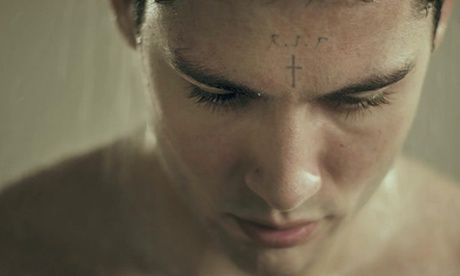Eye For Film >> Movies >> We Are Monster (2014) Film Review
We Are Monster
Reviewed by: Andrew Robertson

Opening with a statement that it is "based on a true story", We Are Monster is pedestrian where it should be polemical, hackneyed in places, and consistently, catastrophically clumsy. In 2000 a young man called Zahid Mubarek was killed by his cellmate in a young offenders institute. Robert Stewart had a history of violence and racism. In 2006 a judicial inquiry determined that there had been a catalogue of failings, but despite a pervading sense of contributory negligence on the part of the authorities Stewart was the only one prosecuted. 'We Are Monster' conveys this information near the end, in the same plain white on black as the opening statement about "the following events..." They are paraphrased here to save you from watching a film that clearly has its heart in the right place, but is so earnest and misguided that it should be avoided.
With two central performances as Stewart, Leeshon Alexander fills the screen - colour-coded by clothing, but still in sweats and prison-issue polo-shirt as he talks to himself, he goads and mumbles, shows flickering footage to himself of past events, bad memories, and swears. Not the quantity of effing and jeffing one would expect, however, but a fair few 'c' and plenty of 'n'. It's weird to listen to - the devil at his shoulder might have had his voice distorted, but the tone is not as confusing as the vocabulary and location. It seems odd to hear the word 'nowt' in Feltham.

The incident that gets this Stewart sent back is harassing a woman at the other end of a chat-line, a person not named in the credits but whom we see ironing as she chats on the outside to someone on the inside. It does not seem credible that a young offender would be able to call a premium rate number from a payphone in an institution, perhaps even less so that he'd be able to ring her from a mobile after tracking her down.
We Are Monster seems to play with chronology, best, perhaps, by starting with the stabbing, but worst by seeming to exist in a smeared-together 'olden days' where psychologists smoke in their offices and a child whose age is credited at five, seven, ten, and twelve, sees footage of what appears to be the Brixton riot of 81 or 85 on a television but is still a young offender after he can get a mobile phone. That Stewart was 20 and in a cell with the teenage Mubarek is never made clear in the film - for all the research that might have been done We Are Monster feels like it's inventing when it's reporting, and there's something off about the tone of the memories - the past is never as clearly defined as we remember, there are overlaps, there are shortcuts too. It's the past so everybody smokes, the prison staff in their office at least, there are flatscreen TFTs on their desktop computers but it's CRTs for the CCTV. No private interview rooms, no envelopes for the letters written home, paper files is credible enough but when a film is ostensibly rooted in truth it makes the audience look more closely.
In one scene in another prison the wall moves, a little, not a lot, but it bows like painted board of some sort rather than resisting like concrete. It's obviously a set, no prison gives the camera the ability to hold two cells in frame at once, to slide through walls to show what's going on next door, but it's obviously a set - the staginess of Stewart twice, never side by side or in the same frame, always cut, always different, could, would, should work, but doesn't quite. In contrast Aymen Hamduchi's Mubarek is smaller, less certain, and seems contrite enough in calls to his family, but we see too much, and of the wrong things - the exposition tends to be laboured; what few gestures towards subtlety are made are lost in repetition.
There are some good elements - the production design makes some good uses of the architecture of authority, and there's certainly positive intent, but We Are Monster seems to be operating at a remove. It's not just the nominally psychological aspect; contrasted with Colours, a film made by young offenders within a Scottish institution, this lacks the ring of authenticity. That's all the more galling since it is, as it tells us from the off, based on a true story.
Institutional racism is a more complicated matter than the head guard being racist. There's lax enforcement of rules, rules formulated to prevent the appearance of trouble more than trouble itself, but not frequently enough to make it seem mundane, commonplace, endemic. We Are Monster has a tendency to show us things twice to make it clear that they're important, but that feels more like a checklist than a dedicated adherence to the notion of duality.
The heavy-handed score doesn't help, nor does the artificiality of the two Stewarts. It never manages to strike a balance between his inner and outer worlds. A braver film would have started with the murder and talked about the justifications for the failure to stop it - it's more interesting to look at why a path is not followed than to show every wrong turn, and Antony Petru's film's first and greatest mistake is to focus on the killer and not the circumstance.
Reviewed on: 25 Jun 2014
















